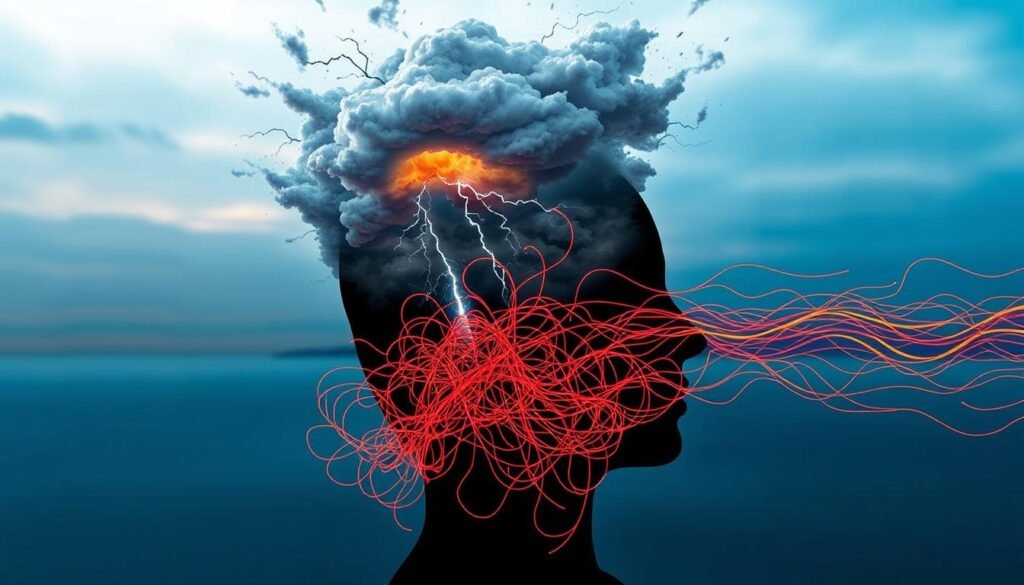About half of adults who suffer from migraines also deal with anxiety disorders. This fact shows a deep connection between anxiety and headaches. Many people face both anxiety and head pain together. Studies suggest anxiety can lead to different kinds of headaches. It affects serotonin levels in the brain and life quality.
It’s important to know about the anxiety and headaches connection. This knowledge helps find the right treatments. Anxiety can cause tension headaches, migraines, and cluster headaches. Talking with doctors about symptoms is key. It leads to a proper diagnosis and treatment. This helps manage both mental health and headaches better.
Key Takeaways
- Around 50% of migraine sufferers also experience anxiety disorders.
- Anxiety triggers over 80% of tension-type headaches.
- 35% of those with anxiety report their headaches interfere with daily activities.
- Tension headaches account for 69% of anxiety-related headaches.
- Implementing relaxation techniques can reduce headache occurrences by up to 30%.
Understanding Anxiety and Its Symptoms
Anxiety combines emotional and physical symptoms that upset daily life. The National Alliance on Mental Illness says over 40 million American adults face anxiety disorders. Psychological signs include nervousness and difficulty concentrating. Physical symptoms may be headaches and fatigue.
There are different anxiety disorders, like social anxiety and generalized anxiety disorder (GAD). Each one has unique symptoms. A 2016 study found anxious children often get headaches. Their anxiety symptoms are usually more severe, showing the deep link between anxiety and mental health.
Knowing how anxiety affects daily life is crucial. 30-50% of people with chronic migraines also have anxiety. About half of those with migraines experience anxiety too. This shows the close connection between the two. Treating anxiety can really help mental health. Spotting these signs early is important for effective treatment and reducing its impact.
What Is an Anxiety Headache?
An anxiety headache is head pain linked to stress or anxiety. Those who get them feel dull or throbbing pain. Anxiety doesn’t cause the pain directly, but it can make it worse.
These headaches come with tension and anxiety, forming a tough cycle. They can be mild or severe and last from 30 minutes to several days. Anxiety disorders like generalized anxiety disorder make people more likely to get these headaches.
To deal with anxiety headaches, it helps to know what triggers them. Learning relaxation techniques can also be beneficial. For more help, visit health articles for insights on managing them with anxiety.
Anxiety-Related Headache Types
Anxiety can show up in many ways, headaches being a prime example. Knowing the different types of anxiety-related headaches is key for handling them. The three main kinds are tension headaches, migraines, and cluster headaches. Each has unique features and links to anxiety, which helps in figuring out their management.
Tension Headaches
Tension headaches top the list of anxiety-related headaches. They feel like a constant, dull ache, as if a band is tightened around your head. Stress usually triggers these headaches, which can last from 30 minutes to days. Studies show women, especially those with anxiety, are more prone to tension headaches. They account for about 90% of all headaches, highlighting their importance.
Migraine Headaches
Migraines are serious and can be worsened by anxiety. They cause severe, throbbing pain on one side of the head and can knock you off your feet. With migraines, you might also feel sick and need to avoid light and noise. Anxiety can make migraines last longer, and women tend to suffer more. Over half of people with migraines could also have an anxiety disorder, research shows.
Cluster Headaches
Cluster headaches are less common but incredibly painful. They come in cycles or “clusters,” disrupting your life. Often linked to anxiety, their exact cause is still a mystery. Yet, knowing how they feel can clue you into their anxiety connection.
Can Anxiety Cause Headaches? Exploring the Connection
The link between anxiety and headaches is complex. Anxiety doesn’t directly cause headaches, but the connection is clear when we look at psychological factors. These factors can make headaches worse and more frequent. Stressful events and everyday pressures lead to tension and migraine headaches. This is especially true for people prone to these conditions.
There’s a disturbing connection between anxiety disorders and migraines. Every year, 18% of women and 6% of men get migraines. Those with mental health issues like anxiety or panic disorders are more likely to suffer. People with migraines often have more anxiety. This creates a cycle where migraines and anxiety make each other worse.
Chronic migraine sufferers report a big increase in anxiety. This affects their treatment and how well they feel in general. Over 50% of people with migraines could have an anxiety disorder at some point. So, psychological factors are key in understanding headache pain.
Understanding how anxiety and headaches affect each other is key. It helps in finding good ways to treat these conditions. Spotting the signs early and getting help can make a big difference. Knowing the anxiety and headaches connection helps in making treatment plans that consider the mental aspects of headaches.

| Statistic | Details |
|---|---|
| Annual Migraine Prevalence | 18% of women, 6% of men |
| Anxiety Disorder Prevalence | 50% of migraine patients may have an anxiety disorder |
| Bidirectional Relationship | Worsening migraines can increase anxiety symptoms |
| Higher Anxiety Symptoms | Individuals with migraines exhibit higher anxiety and psychiatric symptoms |
| Pain Perception During Migraines | Higher pain in various body areas for those with anxiety |
Factors That Contribute to Anxiety and Headaches
Many factors link anxiety and headaches together. Learning about these can help identify why headaches caused by anxiety happen. Daily stresses play a big part in this link.
Stress and Daily Life
Stress is a key cause of headaches. Work stress and family duties can make anxiety worse. This anxiety often leads to headaches. Physical discomfort and pain come from this tension.
Sleep problems and not sticking to a usual routine can make headaches more common. These issues come from everyday stress.
Physical Responses to Anxiety
When anxious, our bodies tighten up muscles, notably around the neck and shoulders. This tension can cause headaches. The cycle of anxiety causing headaches, which then boost anxiety, needs to be broken.
Genetics and Chemical Activity in the Brain
Our genes and brain chemistry greatly affect anxiety and headaches. Studies show that imbalances in neurotransmitters, like serotonin, play a role in both. These biological factors influence how often and how severe the headaches are. Knowing this helps in finding the right treatments.
Symptoms of Anxiety-Triggered Head Pain
Anxiety can show itself in many physical forms, including head pain. It’s key to understand these signs to handle anxiety headaches well. This part talks about usual signs of anxiety-triggered headaches and the need to know what causes them.
Common Symptoms Associated with Anxiety
Those with anxiety-triggered head pain might feel different symptoms. Usual signs include:
- Dull ache or tightness in the head, pointing to tension headaches.
- Throbbing pain that points to migraines, often with nausea and not liking light.
- Increased heart rate and feeling restless.
- Difficulty sleeping, making headaches worse.
Identifying Headache Triggers
Finding out what triggers headaches is crucial for managing them. It helps to keep track of headaches to see patterns. Common triggers include:
- Stress from daily activities, like work or family duties.
- Changes in daily routine or surroundings.
- Lack of good sleep, made worse by anxiety.
- Eating habits, especially if lacking important nutrients.
Knowing what triggers headaches helps in managing anxiety headaches better. This info leads to taking steps to prevent them and living a healthier lifestyle.

Managing Anxiety-Related Headaches Effectively
To handle anxiety-related headaches, it’s best to use several approaches together. You should combine relaxation, lifestyle changes, and seeking help from professionals. This approach not only eases the headaches. It also boosts your overall health.
Relaxation Techniques
Adding relaxation techniques to your day can help manage anxiety and reduce headaches. Doing yoga, tai chi, and deep breathing can really lower stress, a big headache trigger. Keeping your surroundings calm and practicing mindfulness can make your mind clearer and your emotions stronger.
Lifestyle Changes to Reduce Anxiety
Changing your lifestyle is key to dealing with anxiety headaches. Being active, getting enough sleep, and eating well are crucial. Cutting back on caffeine and alcohol helps lower anxiety. Drinking plenty of water keeps you healthy. And, making your day-to-day life simpler can make things less stressful, easing your headaches.
Therapy and Medication Options
If anxiety headaches are a problem, therapy and sometimes drugs can help a lot. Cognitive Behavioral Therapy (CBT), for example, works by changing negative thinking and behavior. If needed, medication for anxiety or pain can be customized for you. Getting advice from a professional means getting care that specifically targets your anxiety, helping to reduce headaches. For more information on managing anxiety and headaches, check out this link.
Preventing Anxiety-Triggered Headaches
To prevent anxiety-triggered headaches, start by recognizing what sparks them. Making changes in your lifestyle to handle daily stress can really help lessen how often they happen. Knowing how to navigate these changes can give power back to those who deal with anxiety and headaches.
Identifying and Avoiding Triggers
Keeping a diary can help spot what causes your headaches. You might find patterns linked to:
- Stressful situations, such as work or personal challenges
- Poor dietary habits, including skipped meals or excessive caffeine
- Inadequate hydration
- Lack of sleep
Once you know your triggers, you can take steps to avoid them. This is a key part of stopping anxiety-triggered headaches.
The Role of Regular Exercise
Exercise is key in the fight against these headaches. Being active reduces stress and lifts your mood. Research shows regular, moderate workout can cut down headaches by 25-30%. Exercise benefits include:
- Improved blood flow and less muscle tension
- Better sleep patterns
- Greater ability to manage stress
Starting a workout plan can be an important step in dealing with anxiety-related headaches.
Importance of Sleep
Good sleep habits are critical for avoiding anxiety-triggered headaches. Not sleeping well can make headaches worse, especially tension headaches. Tips for better sleep include:
- Sticking to a regular bedtime
- Reducing screen time before bed
- Having a cozy place to sleep
Good sleep not only helps prevent headaches. It also is vital for your overall mental health.

Medical Treatments for Anxiety and Headaches
Dealing with anxiety and headaches takes a well-rounded approach. Doctors prescribe different meds based on what you need and how you might react. This includes checking out symptoms and side effects.
Anti-Anxiety Medications
Doctors often start with SSRIs like fluoxetine for anxiety. These meds usually start working in 2 to 6 weeks. You might take them for 6 to 12 months. SNRIs are another option but not as good for OCD. Be careful with benzodiazepines because of risks like dependence. Even so, when used right, they’re not habit-forming. But, be aware, the FDA has noted that antidepressants could raise suicide risks in young adults.
Headache Treatment Options
Many meds help with headache symptoms linked to anxiety. Beta blockers like atenolol help prevent migraines. Tricyclic antidepressants, such as nortriptyline, are good for chronic headaches and can also help with anxiety and depression. Some people find relief in acupuncture or herbal treatments. These options offer a more holistic path.
Role of Cognitive Behavioral Therapy (CBT)
CBT is key in tackling anxiety and headaches. It changes negative thoughts and boosts coping skills. With time, this leads to less anxiety and fewer headaches. Mixing CBT with meds often gives better results. It offers a comprehensive strategy for those dealing with these issues.
The Impact of Pain on Mental Health
Chronic pain and mental health are closely linked, affecting many people deeply. This kind of pain, especially from headaches, can increase anxiety. This results in a tough cycle that hits our well-being hard. Having chronic pain and anxiety together leads to more mental health issues, making treatment harder.
Relationship Between Chronic Pain and Anxiety
Chronic pain makes anxiety worse, causing a lot of stress for those suffering. Studies show many with headaches also have anxiety disorders. Treating both the physical pain and the mental aspects is crucial. It leads to better health management overall.
Long-term Effects of Anxiety Headaches
Anxiety headaches can have lasting negative effects. They can cause severe disabilities and emotional problems. This can hurt one’s mental health even more. People suffering from these headaches often feel stuck, which messes up how they deal with pain and anxiety. Treatments that focus on anxiety’s root causes can improve their situation.
| Factor | Impact on Mental Health | Notes |
|---|---|---|
| Chronic Pain | Increases anxiety levels | Can lead to depression and further mental health issues |
| Anxiety Disorders | Exacerbates perception of pain | May lead to reduced pain tolerance |
| Headache Frequency | Impairs daily functioning | Can negatively affect relationships and social activities |
| Psychological Factors | Influences treatment adherence | Beliefs about control impact outcomes |
Seeking Professional Help
Knowing when to seek professional help is crucial for dealing with anxiety and headaches. Many people might delay seeing a healthcare provider, even with ongoing or worsening symptoms. If you notice changes in your headache patterns, more frequent headaches, or if headaches are making daily life hard, it’s time to ask for help.
When to Consult a Doctor
If your headaches get worse, happen more often, or disrupt your day-to-day life, you need to see a doctor. It’s important to keep track of your symptoms. You should get in touch with a doctor if you see changes, your headaches last a long time, you have new symptoms like trouble seeing or talking, or over-the-counter meds don’t help.
- New or worsening headache patterns
- Persistent headaches lasting several days
- Headaches accompanied by other concerning symptoms, such as vision changes or difficulty speaking
- Headaches that do not respond to over-the-counter medication
Importance of Comprehensive Care
Getting the right treatment for anxiety can really help you feel better overall. This means caring for both your mind and body. Treatment might include:
- Cognitive Behavioral Therapy (CBT) to learn how to cope better
- Medication to ease anxiety
- Regular check-ups for updates on how you’re doing and to make any changes needed
Trying to tackle both anxiety and headaches together can lead to a fuller, happier life. This approach helps you understand how they’re linked and shows you ways to get better.
| Indicators for Seeking Help | Recommended Actions |
|---|---|
| Frequent or worsening headaches | Consult a doctor for a thorough evaluation |
| Headaches impacting daily activities | Discuss treatment options with a healthcare provider |
| Presence of other severe symptoms | Immediate medical attention is advised |
| Lack of response to typical medication | Explore other potential treatments with a doctor |
Conclusion
The link between anxiety and headaches is complex. Many people with chronic migraines also struggle with anxiety disorders. Studies show that up to 75% of chronic migraine sufferers might have anxiety too. This shows why it’s crucial to understand how these two conditions are connected.
To handle anxiety-related headaches well, it’s important to know the different headache types linked with anxiety. These include tension, migraine, and cluster headaches. By focusing on key areas such as stress, how you sit and sleep, you can create an effective treatment plan. Techniques to relax, changes in lifestyle, and seeking help from professionals are key steps for relief.
By regularly checking in on yourself and using proactive strategies, you can greatly better your life. It’s good to look for a holistic approach. This not only helps improve mental health but can also reduce headache pain. Doing so enhances overall well-being.